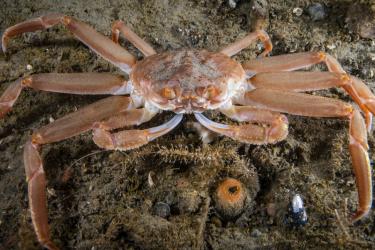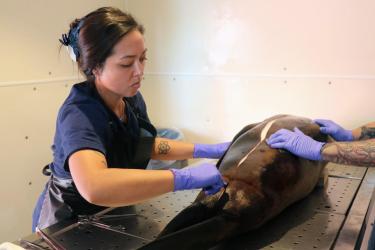Nick Dubitzky pulls in a line of cultured sugar kelp to show workshop participants at the Hood Canal Mariculture kelp farm. Photo courtesy of Samantha Larson of Washington Sea Grant.
For 28 years Riley Starks has fished near Lummi Island, Washington, netting Chinook, coho, sockeye, pink, and chum salmon. He also owns a bed and breakfast on the island that specializes in providing guests with unique skill-building experiences. They can smoke salmon and make jam and ikura, which is seasoned and cured salmon roe. He has observed many of the Puget Sound area’s 17 species of kelp—or brown macroalgae—while tending his nets.
He jumped at the chance to further build his own skills as part of intensive training in seaweed farming sponsored by Washington Sea Grant. In early February, he joined about 30 seaweed enthusiasts, including representatives of four tribes, seven military veterans, several commercial fishermen, and shellfish farmers. They took a three-day deep dive into the seaweed industry.
“The training was comprehensive and excellent,” Starks said. “I particularly appreciated the emphasis on the importance of working with the tribes early in the process—they have unique and important rights that must be respected.”
Seaweed farming has taken off in recent years in Maine and Alaska, which have dozens of farms and more in the works. Despite the increase in domestic production, the United States remains the fifth largest importer of seaweed for human consumption. Seaweed is added to many products, such as salsas, sauces, salads, seasonings, and pastas, used in restaurants and at home. That market demand, plus the health and environmental benefits of seaweed farming, have generated interest in Washington state. Uncertainty exists about the permitting process and access to local processing facilities, given the newness of kelp farming in local waters.
Highlights of training
The in-person training built upon an online workshop hosted by Washington Sea Grant, NOAA Fisheries, and the Washington Department of Veteran Affairs in November 2019. This 2020 training and in-person curriculum highlighted issues including:
- Tribal fishing rights
- Complex permitting pathways
- Intricate logistics of designing and operating a seaweed farm
- The need for diligent business planning and product development
It brought together prospective farmers, local researchers, and regulatory agencies at multiple levels.
“Washington Sea Grant has a long history of working with the fishing and seafood industries, and this training was provided to support individuals looking to get into a sustainable form of ocean farming that is virtually brand new in local waters,” said Meg Chadsey, the organization’s lead for developing the training.
Trainees experienced first-hand the often chilly and windy conditions that govern kelp farming on a site visit to Hood Canal Mariculture. It produces sugar kelp, and is currently the lone seaweed farm operating in Puget Sound.
New Opportunities for Veterans
Some veterans are also showing interest in seaweed farming. “It can be a good next-career option for interested veterans, who get to spend time on the water and experience the restorative effect and therapeutic benefits of working outdoors,” said John Floberg of the NOAA Restoration Center, who leads the NOAA WDVA Veterans Conservation Corps Fisheries Internship Program. NOAA Fisheries has also recently invested in seaweed aquaculture internships for veterans in the hope the internships will lead to employment opportunities.
NOAA Fisheries has supported seaweed farming investigations for several years. We partnered with the Puget Sound Restoration Fund to develop seed for kelp reproduction at the Northwest Fisheries Science Center’s new kelp lab. We are working together to develop recommended best practices for future seaweed farm design and operations. We’re also assessing the effects of sugar kelp cultivation at the Hood Head kelp farm.
Recorded presentations and guidance offer a valuable resource on the current state of seaweed aquaculture in Washington State.
Asked what’s next for him, Starks stated, “Larry Mellum is my partner in this endeavor, and we are pursuing using our reef net site as a seasonal seaweed farm. Each site is about one acre. The advantages are that the anchors, etc. are already in place and the site has historically been used for commercial work. And it would employ off-season fishers. So there is lots of synergy. And maybe someday processing and eating kelp will be a unique experience for my guests at the bed and breakfast. Seaweed and ikura go great together!”





